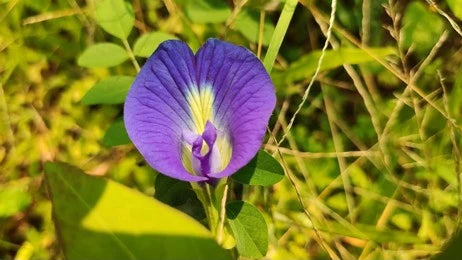This perennial herb has a tiny, densely hairy, woody, branching rootstock that grows 4 to 12 inches long. After rising to a certain height, the branches disperse across the grass and the ground. The length of the leaves ranges from 0.5 to 1.5 inches. The base is sharp, and the petiole is small. When touched, the flower's broad, glossy upper sections release a radish-like scent. The flowers have thick rose, pink, or white hues. Its seeds are brownish or blackish in hue and have funnel-shaped shapes. The entire bush has a grey or black plum appearance.
This plant grows naturally in India in rocky and fallow regions during the rainy season. The flowers fall into three categories because of the differences in color.
- White
- Blue
- Canscora decussate (Gentianaceac).
Shankhahuli is another name for these plants.
General Information
Shankhpushpi is regarded as a well-known Ayurvedic remedy for enhancing intelligence and memory. It aids in mental renewal and can be used to treat toxicity and other issues including vomiting. Additionally, it has been used for many years to treat conditions like constipation, cerebral irregularities, epilepsy, edema, anxiety, hypertension, neurosis, stress, sleeplessness, asthma, and bronchitis. Additionally, using this herb is highly effective in treating neurological illnesses like Alzheimer's and dementia, among others.
The entire plant is full of therapeutic qualities. Studies on the chemical composition of the entire plant have revealed the presence of sucrose, hydroxycinnamic acid, glycosides, coumarins, flavonoids, and alkaloids in addition to sitosterol glycoside. These phytochemical substances show a range of medicinal qualities that can be used to treat different types of illnesses.
Habitat
Commonly found in India and also cultivated.
Classification
- Kingdom: Plantae
- Division: Magnoliophyta
- Class: Magnoliopsida
- Order: Solanales
- Family: Gentianaceae
- Genus: Convolvulus
- Species: pluricaulis
Names
- Latin Name - Convolvulus pluricaulis
- Hindi Name - Sankhahul, Shankhahuli
- Sanskrit Name - Ksheerapushpi, Mangala Kusuma, Shankhava, Shankhpushpi
- Telugu Name - Sankhapuspi
- Marathi Name - Sankhvel
- Gujarati Name - Sankhavali
- English Name - English speedwheel
- Urdu Name - Sankali
Ayurvedic Properties
|
Particular |
Hindi / Sanskrit |
English |
|
Rasa (Taste) |
Tikta |
Bitter |
|
Guna (Physical Property) |
Picchila, Snigdha |
Sticky, Oily |
|
Virya (Potency) |
Sheeta |
Cold |
|
Vipaka (Post-Digestive Taste) |
Madhura |
Sweet |
Effects On Doshas
It balances pitta and kapha doshas.
Practical Uses
- Shankhpushpi is regarded in Ayurveda as a wonderful brain tonic that improves memory, intelligence, learning, and retention. Additionally, it is a herb that promotes brain renewal.
- Asthma, bronchitis, cerebral abnormalities, epilepsy, edema, urinary disorders, constipation, and extremely dangerous and complex brain (mainly neurodegenerative) diseases like Alzheimer and dementia, among other disorders, have all been treated with it since ancient times.
- Using this plant helps control vertigo symptoms. This herb aids in nervous system relaxation. Additionally, it relieves vertigo-related symptoms like headache, anxiety, stress, and cognitive issues.
- This herb is well-known for its ability to help with respiratory issues, including bronchitis, asthma, coughing, and common colds. In addition to strengthening immunity to ward against different bacterial or viral diseases, it aids in clearing airways.
- The treatment of urogenital problems can greatly benefit from the use of this herb. It aids in relieving symptoms such as a burning sensation, urethral edema, and painful urination.
- This herb has the ability to stimulate sperm. It helps increase sperm production in guys and also increases sperm quality.
- People with insomnia and other sleeping difficulties can benefit from using this plant.
Parts Used
Whole plant, seeds, root, ash (alkali).
Dosage
Paste 1-2 g and decoction 50-100 ml.

